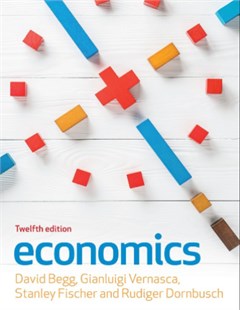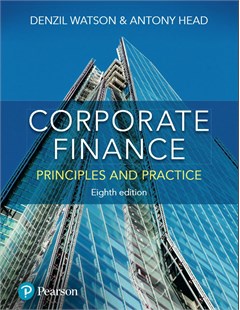Economics (Twelfth edition)
Economics is all around us. It influences our daily lives, our society, political decisions, environmental concerns and the future we leave for our children. The twelfth edition of Economics by David Begg and Gianluigi Vernasca is a focused toolkit for studying economics. It enables the reader to understand how economics underpins the world we live in, by presenting the economic theory in a clear and accessible way and applying it to real world situations.
2020
Economics is all around us. It influences our daily lives, our society, political decisions, environmental concerns and the future we leave for our children. The twelfth edition of Economics by David Begg and Gianluigi Vernasca is a focused toolkit for studying economics. It enables the reader to understand how economics underpins the world we live in, by presenting the economic theory in a clear and accessible way and applying it to real world situations.
This new edition has been revised and updated to include the latest topics and issues, such as the role of information and the digital economy, immigration, and globalization. This material, combined with a rich array of pedagogical features, encourages students to understand not only our economic past and present, but also our changing world and the way in which economics can make sense of it.
Brief table of contents, Introduction: Economics and the economy; Tools of economic analysis. Positive microeconomics: Demand, supply and the market; Elasticities of demand and supply; Consumer choice and demand decisions; Choice under uncertainty and behavioural economics; Introducing supply decision; Production, costs and supply; Perfect competition and pure monopoly; Market structure and imperfect competition; Labour market; Factor markets, income distribution, and inequality; The economics of information. Welfare economics: Welfare economics; Government spending and revenue; Governing the market. Macroeconomics: Introduction to macroeconomics; Supply-side economics and economic growth; Output and aggregate demand; Fiscal policy and foreign trade; Money, banking and financial markets; Money demand, interest rates and monetary transmission; Monetary and fiscal policy; Aggregate supply, prices and adjustment to shocks; Inflation, expectations and credibility; Unemployment; Exchange rates and the balance of payments; Open economy macroeconomics; Business cycles. The world economy: International trade; Exchange rate regimes; Globalization, national sovereignty and the world economy.
 |  |  |
| Principles of Economics (8th) | Corporate Finance: Principles and Practice |
Chủ Nhật, 13:22 14/05/2023
Copyright © 2018 Hanoi University of Industry.